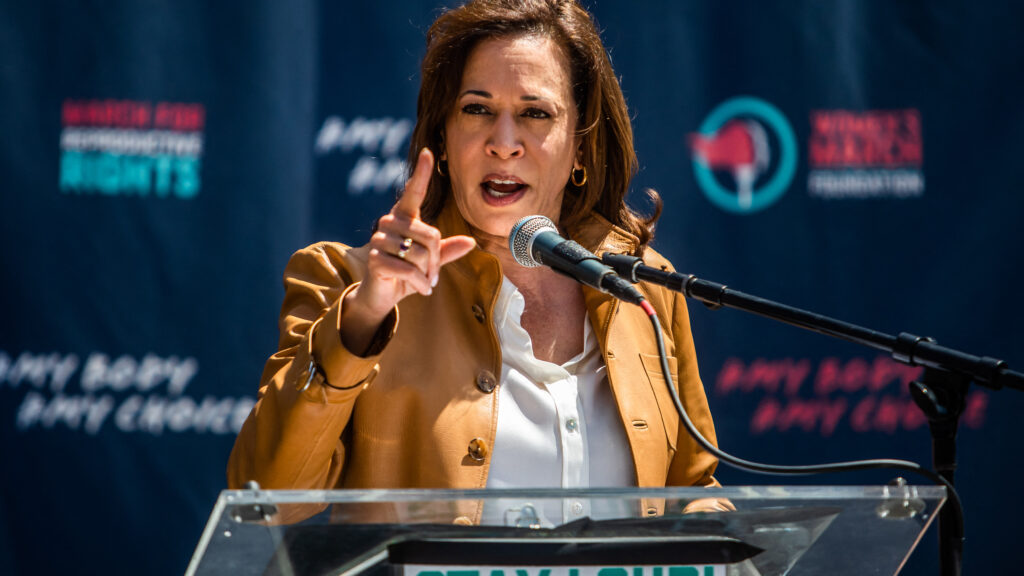WASHINGTON — Former President Trump doesn’t want to talk much about abortion in his 2024 presidential campaign. But as his muddled messaging on mifepristone on Thursday showed, Democrats are ready to seize on any opportunities he presents to keep reproductive rights in the national spotlight.
A reporter asked the GOP presidential candidate during a lengthy press conference at Mar-a-Lago whether he would direct the Food and Drug Administration to “revoke access” to the abortion pill mifepristone if elected to a second term. Although Trump’s answer was hard to interpret, he did not shut down the idea.
advertisement
“You could do things that will be — would supplement. Absolutely. Those things are pretty open and humane,” he said. “But you have to be able to have a vote, and all I want to do is give everybody a vote.”
Trump had previously said during the June 27 debate that he supported the Supreme Court’s ruling leaving telehealth prescribing of mifepristone unfettered and that he would not pursue a national abortion ban. In light of his more vague stance Thursday, Democrats and reproductive rights advocates argued that a second Trump administration could undercut abortion access in myriad ways outside of a national ban that many Republicans have already deemed politically unfeasible.
Vice President Kamala Harris’ campaign was quick to post clips of Trump’s latest mifepristone answer to social media platforms and harken back to the Project 2025 narrative — which calls for national abortion bans — that Trump has desperately sought to distance himself from in recent weeks.
advertisement
“Today Donald Trump made clear what his Project 2025 allies have been saying for months: If he is elected, he will use his power and every tool of the federal government to rip away access to medication abortion, effectively banning abortion nationwide in all 50 states,” Harris campaign manager Julie Chávez Rodriguez said in a statement.
“We talk a lot about abortion bans, and we can talk about those because I’m sure he would sign it if it was possible,” said Dara Kass, an emergency department physician and professor at Columbia University Medical Center. “But he’ll do a lot before that’s possible.”
Other Democrats were swift to blast Trump’s response as well.
“Donald Trump is incapable of putting together complete sentences, but this should be a simple answer. I support access to medication abortion,” Sen. Elizabeth Warren (D-Mass.) wrote on X.
The FDA approved mifepristone in 2000 for abortions up to seven weeks of pregnancy and later extended the approval to 10 weeks. During the coronavirus pandemic, the agency allowed telehealth prescribing of the pill. Conservative Christian groups challenged the approval and the FDA’s relaxed restrictions in a case the Supreme Court sent back to lower courts this spring.
Telehealth abortion increased in the wake of Roe’s upheaval in 2022, according to recent data from the Society of Family Planning. Telemedicine prescribing accounted for one-fifth of abortions in the first quarter of 2024, up 5% from before the Supreme Court decision.
The Trump campaign did not respond to requests for comment on his statement or stance on mifepristone access.
The former president also appeared eager to downplay the impact that abortion rights could have on the election during his press conference, even as Harris and running mate Tim Walz, governor of Minnesota, rally voters on the campaign trail over his evolving and sometimes hazy stance.
Trump on Thursday said that the issue of abortion rights is “very much tempered down” now that states are shaping the policies. “Abortion has become much less of an issue. I think it’s actually going to be a very small issue,” he insisted at Mar-a-Lago.
Abortion access is on the November ballot in at least five states, with advocates in six others planning to secure votes as well. Trump even acknowledged that a ballot initiative in Florida, his home state since 2021, “will go in a little more liberal way than people thought.” The ballot would protect abortion up to viability of the fetus, reversing a six-week ban.
Trump still maintains that the fall of Roe is universally popular despite polling suggesting most Americans oppose the 2022 Supreme Court decision.
However, his softened stance in recent months — insisting he will leave abortion policy up to the states and forgo a national ban — has roiled anti-abortion conservatives as well.
The frustration reignited last month, when Trump’s vice presidential pick JD Vance, staunchly anti-abortion himself, told NBC he too supported the Supreme Court’s decision leaving mifepristone access unchanged. Some accused Trump and Vance of abandoning a longtime GOP party principle, while others acknowledged that it would be a losing issue in 2024 elections.
“I feel certain that Senator Vance was responding to a question about a complete ban that he deems politically impossible at the moment,” Marjorie Dannenfelser, president of Susan B. Anthony Pro-Life America, said in a statement to STAT at the time. “I’m equally certain that he believes that doctors should be involved in the administration of these dangerous drugs and that states should have the right to regulate them.”

